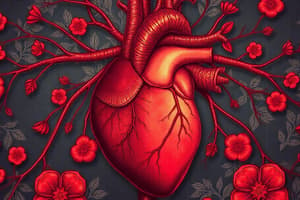Podcast
Questions and Answers
The cardiovascular system transports blood via a network of blood ______.
The cardiovascular system transports blood via a network of blood ______.
vessels
Blood provides a medium to supply organs and tissues with ______ and oxygen.
Blood provides a medium to supply organs and tissues with ______ and oxygen.
nutrients
Blood is made up of plasma and cellular ______.
Blood is made up of plasma and cellular ______.
components
Type AB blood has type A and type B antigens in RBCs; it is known as a ______ recipient blood.
Type AB blood has type A and type B antigens in RBCs; it is known as a ______ recipient blood.
Type O blood contains both anti-A and anti-B antibodies in plasma; it is called a universal ______ blood.
Type O blood contains both anti-A and anti-B antibodies in plasma; it is called a universal ______ blood.
Rh-negative blood has no Rh factor present in RBCs; anti-Rh antibodies can develop if Rh-positive RBCs are ______ into their bodies.
Rh-negative blood has no Rh factor present in RBCs; anti-Rh antibodies can develop if Rh-positive RBCs are ______ into their bodies.
Blood helps in ______ by distributing heat through the body.
Blood helps in ______ by distributing heat through the body.
Red blood cells are also known as ______.
Red blood cells are also known as ______.
Flashcards
What is the function of the cardiovascular system?
What is the function of the cardiovascular system?
The cardiovascular system is responsible for transporting blood throughout the body, delivering nutrients and oxygen to organs and tissues, removing waste products for excretion, and transporting immune cells and clotting factors.
What is blood and what are its key functions?
What is blood and what are its key functions?
Blood is a complex fluid tissue containing proteins, ions, and cellular components. It is responsible for transporting nutrients, oxygen, hormones, and waste products. It also plays a crucial role in immune function and thermoregulation.
What is plasma?
What is plasma?
Plasma makes up about 50-60% of total blood volume and is a watery matrix containing ions and proteins.
What are the cellular components of blood?
What are the cellular components of blood?
Signup and view all the flashcards
Describe the ABO blood type system.
Describe the ABO blood type system.
Signup and view all the flashcards
Why is Type AB blood called the universal recipient and Type O blood called the universal donor?
Why is Type AB blood called the universal recipient and Type O blood called the universal donor?
Signup and view all the flashcards
Explain the Rh blood type system.
Explain the Rh blood type system.
Signup and view all the flashcards
What is Rh incompatibility and why is it important?
What is Rh incompatibility and why is it important?
Signup and view all the flashcards
Study Notes
The Cardiovascular System
- The cardiovascular system moves blood throughout the body through a network of blood vessels.
- Blood acts as a medium to deliver nutrients and oxygen to organs and tissues, and remove metabolic waste.
- Blood also transports immune elements and aids in clotting wounds.
Blood Composition
- Blood is a fluid tissue composed of proteins, ions, and cellular components.
- Blood is made of plasma and cellular components.
- Plasma is a watery matrix of ions and proteins (50-60% of total blood volume).
- Cellular components are different types of cells:
- Red blood cells (erythrocytes)
- White blood cells (leukocytes)
- Platelets (thrombocytes) (40-50% of total blood volume).
Blood Functions
- Transports nutrients, respiratory gases, hormones, and cellular wastes.
- Contains immune elements to protect against pathogens.
- Helps thermoregulation by distributing heat throughout the body.
ABO Blood Group System
- Type A: Has type A antigens on red blood cells (RBCs) and anti-B antibodies in the plasma.
- Type B: Has type B antigens on RBCs and anti-A antibodies in the plasma.
- Type AB: Has both type A and type B antigens on RBCs and no antibodies in the plasma (universal recipient).
- Type O: Has no A or B antigens on RBCs and both anti-A and anti-B antibodies in the plasma (universal donor).
Rh Blood Group System
- Rh-positive: Has Rh factor antigens on RBCs.
- Rh-negative: Lacks Rh factor antigens on RBCs. Can develop anti-Rh antibodies if exposed to Rh-positive blood (e.g., in pregnancy).
Blood Compatibility
- Compatibility for blood transfusions is critical. Blood type compatibility charts exist to prevent potentially severe reactions.
Studying That Suits You
Use AI to generate personalized quizzes and flashcards to suit your learning preferences.




